Search Results for 'fancy'
-
AuthorSearch Results
-
February 5, 2026 at 2:14 am #8054
In reply to: The Hoards of Sanctorum AD26
Mrs. Fennel was beating the dust out of a rug with more violence than was strictly necessary. “Another bloody rug,” she moaned. “If I had a penny for every rug in this place, Boothroyd!”
She shook her head, then cursed, as a cascade of dust floated from her hair. “No idea which of them four picked this one up from god-knows-where, but they’re each as bad as the other.”
She paused to wipe her brow with a corner of her apron, wheezing slightly. “I’m telling you,” she whispered, peering at him conspiratorially, “it’s not just clutter anymore. It’s … REMAINS.”
Boothroyd looked up from a tray of seedlings, his brow furrowing. “Remains, Mrs. F?”
“Human remains!” she hissed, leaning in so close he could smell the peppermint gum on her breath. “A stinking, ancient bone in a plastic box, and Miss Cerenise acting like it’s a piece of the Crown Jewels. Then there’s Miss Yvoise, snapping photos on her fancy phone like she’s … I dunno … Sherlock Holmes or something. And the smell… dear lord, I couldn’t get out of there fast enough.”
Boothroyd grunted, his gaze drifting toward the cellar door. “They do seem particularly out of control lately. My boots are still damp from that ridiculous boat business. I’m not sure they know which century they’re living in.”
“Anyway bone or no,” Mrs. Fennel huffed, “if that gentleman from the Council shows up, that Varlet fellow they’re on about, we’ll all be out on the street, mark my words!”
March 28, 2025 at 10:28 pm #7881In reply to: The Last Cruise of Helix 25
Mars Outpost — Welcome to the Wild Wild Waste
No one had anticipated how long it would take to get a shuttle full of half-motivated, gravity-averse Helix25 passengers to agree on proper footwear.
“I told you, Claudius, this is the fancy terrain suit. The others make my hips look like reinforced cargo crates,” protested Tilly Nox, wrangling with her buckles near the shuttle airlock.
“You’re about to step onto a red-rock planet that hasn’t seen visitors since the Asteroid Belt Mining Fiasco,” muttered Claudius, tightening his helmet strap. “Your hips are the least of Mars’ concerns.”
Behind them, a motley group of Helix25 residents fidgeted with backpacks, oxygen readouts, and wide-eyed anticipation. Veranassessee had allowed a single-day “expedition excursion” for those eager—or stir-crazy—enough to brave Mars’ surface. She’d made it clear it was volunteer-only.
Most stayed aboard, in orbit of the red planet, looking at its surface from afar to the tune of “eh, gravity, don’t we have enough of that here?” —Finkley had recoiled in horror at the thought of real dust getting through the vents and had insisted on reviewing personally all the airlocks protocols. No way that they’d sullied her pristine halls with Martian dust or any dust when the shuttle would come back. No – way.
But for the dozen or so who craved something raw and unfiltered, this was it. Mars: the myth, the mirage, the Far West frontier at the invisible border separating Earthly-like comforts into the wider space without any safety net.
At the helm of Shuttle Dandelion, Sue Forgelot gave the kind of safety briefing that could both terrify and inspire. “If your oxygen starts blinking red, panic quietly and alert your buddy. If you fall into a crater, forget about taking a selfie, wave your arms and don’t grab on your neighbor. And if you see a sand wyrm, congratulations, you’ve either hit gold or gone mad.”
Luca Stroud chuckled from the copilot seat. “Didn’t see you so chirpy in a long while. That kind of humour, always the best warning label.”
They touched down near Outpost Station Delta-6 just as the Martian wind was picking up, sending curls of red dust tumbling like gossip.
And there she was.
Leaning against the outpost hatch with a spanner slung across one shoulder, goggles perched on her forehead, Prune watched them disembark with the wary expression of someone spotting tourists traipsing into her backyard garden.
Sue approached first, grinning behind her helmet. “Prune Curara, I presume?”
“You presume correctly,” she said, arms crossed. “Let me guess. You’re here to ruin my peace and use my one functioning kettle.”
Luca offered a warm smile. “We’re only here for a brief scan and a bit of radioactive treasure hunting. Plus, apparently, there’s been a petition to name a Martian dust lizard after you.”
“That lizard stole my solar panel last year,” Prune replied flatly. “It deserves no honor.”
Inside, the outpost was cramped, cluttered, and undeniably charming. Hand-drawn maps of Martian magnetic hotspots lined one wall; shelves overflowed with tagged samples, sketchpads, half-disassembled drones, and a single framed photo of a fireplace with something hovering inexplicably above it—a fish?
“Flying Fish Inn,” Luca whispered to Sue. “Legendary.”
The crew spent the day fanning out across the region in staggered teams. Sue and Claudius oversaw the scan points, Tilly somehow got her foot stuck in a crevice that definitely wasn’t in the geological briefing, which was surprisingly enough about as much drama they could conjure out.
Back at the outpost, Prune fielded questions, offered dry warnings, and tried not to get emotionally attached to the odd, bumbling crew now walking through her kingdom.
Then, near sunset, Veranassessee’s voice crackled over comms: “Curara. We’ll be lifting a crew out tomorrow, but leaving a team behind. With the right material, for all the good Muck’s mining expedition did out on the asteroid belt, it left the red planet riddled with precious rocks. But you, you’ve earned to take a rest, with a ticket back aboard. That’s if you want it. Three months back to Earth via the porkchop plot route. No pressure. Your call.”
Prune froze. Earth.
The word sat like an old song on her tongue. Faint. Familiar. Difficult to place.
She stepped out to the ridge, watching the sun dip low across the dusty plain. Behind her, laughter from the tourists trading their stories of the day —Tilly had rigged a heat plate with steel sticks and somehow convinced people to roast protein foam. Are we wasting oxygen now? Prune felt a weight lift; after such a long time struggling to make ends meet, she now could be free of that duty.
Prune closed her eyes. In her head, Mater’s voice emerged, raspy and amused: You weren’t meant to settle, sugar. You were meant to stir things up. Even on Mars.
She let the words tumble through her like sand in her boots.
She’d conquered her dream, lived it, thrived in it.
Now people were landing, with their new voices, new messes, new puzzles.
She could stay. Be the last queen of red rock and salvaged drones.
Or she could trade one hell of people for another. Again.
The next morning, with her patched duffel packed and goggles perched properly this time, Prune boarded Shuttle Dandelion with a half-smirk and a shrug.
“I’m coming,” she told Sue. “Can’t let Earth ruin itself again without at least watching.”
Sue grinned. “Welcome back to the madhouse.”
As the shuttle lifted off, Prune looked once, just once, at the red plains she’d called home.
“Thanks, Mars,” she whispered. “Don’t wait up.”
February 28, 2025 at 10:03 am #7838In reply to: The Last Cruise of Helix 25
After a short rest, Molly, Gregor and Petro ventured outside to wander around before the rain started.
“Az Aranysimító,” Molly read the sign above the door. “Nemzetközi Likőrök. What does that say, Petro?”
The old man smiled at Molly, a rare gleam in his rheumy eye. “Fancy a night out, old gal? It’s a pub, The Golden Trowel. International liquors, too. Pénteki Kvízestek,” Petro added, “Quiz nights on Fridays. I wonder if it’s Friday today?”
“Ha! Who knows what day of the week it is.” Molly took Petro’s arm, coquettishly accepting the date. “I wonder if they have any gin.”
“Count me in for a booze up,” Gregor said trying not to look miffed. “Now, now, boys,” laughed Molly, thoroughly enjoying herself.
“What are you all laughing at?” Vera joined them, cradling a selection of fruits held in her voluminous skirt. Gregor averted his eyes from the sight of her purple veined thighs. He said, “Come on, let’s go inside and find you a crate for those.”
Brushing aside the dusty cobwebs, they made their way to the bar, miraculously and marvellously well stocked. Gregor emptied a crate of empty bottles for Vera, while Petro surveyed the bottles on the shelf behind the bar. Molly stood transfixed looking at a large square painting on the wall. A golden trowel was depicted, on a broken mosaic in a rich combination of terra sigillata orange and robins egg blue colours. Along the bottom of the picture were the words
“Nem minden darab illik rá első pillantásra. Ülj le a töredékekkel, mielőtt megpróbálnád összekényszeríteni őket.”

Triumphantly, Petro handed a nearly full bottle of Larios gin to Molly. “I’ll get you a glass but we may need to get Finja in here, they’re all very dirty. That’s nice,” he said, looking up at the picture.
“Not every piece fits at first glance. Sit with the fragments before trying to force them together.”
“Oh, I like that!” exclaimed Molly, giving Petro a grateful smile. “I’d never have known that if you hadn’t been here.”
Petro’s chest swelled with pride and happiness. It was the first time in many years that he’d felt useful to anyone.
January 12, 2025 at 11:51 am #7711In reply to: Quintessence: Reversing the Fifth
Matteo — December 2022
Juliette leaned in, her phone screen glowing faintly between them. “Come on, pick something. It’s supposed to know everything—or at least sound like it does.”
Juliette was the one who’d introduced him to the app the whole world was abuzz talking about. MeowGPT.
At the New Year’s eve family dinner at Juliette’s parents, the whole house was alive with her sisters, nephews, and cousins. She entered a discussion with one of the kids, and they all seemed to know well about it. It was fun to see the adults were oblivious, himself included. He liked it about Juliette that she had such insatiable curiosity.
“It’s a life-changer, you know” she’d said “There’ll be a time, we won’t know about how we did without it. The kids born now will not know a world without it. Look, I’m sure my nephews are already cheating at their exams with it, or finding new ways to learn…”
“New ways to learn, that sounds like a mirage…. Bit of a drastic view to think we won’t live without; I’d like to think like with the mobile phones, we can still choose to live without.”
“And lose your way all the time with worn-out paper maps instead of GPS? That’s a grandpa mindset darling! I can see quite a few reasons not to choose!” she laughed.
“Anyway, we’ll see. What would you like to know about? A crazy recipe to grow hair? A fancy trip to a little known place? Write a technical instruction in the style of Elizabeth Tattler?”“Let me see…”
Matteo smirked, swirling the last sip of crémant in his glass. The lively discussions of Juliette’s family around them made the moment feel oddly private. “Alright, let’s try something practical. How about early signs of Alzheimer’s? You know, for Ma.”
Juliette’s smile softened as she tapped the query into the app. Matteo watched, half curious, half detached.
The app processed for a moment before responding in its overly chipper tone:
“Early signs of Alzheimer’s can include memory loss, difficulty planning or solving problems, and confusion with time or place. For personalized insights, understanding specific triggers, like stress or diet, can help manage early symptoms.”Matteo frowned. “That’s… general. I thought it was supposed to be revolutionary?”
“Wait for it,” Juliette said, tapping again, her tone teasing. “What if we ask it about long-term memory triggers? Something for nostalgia. Your Ma’s been into her old photos, right?”
The app spun its virtual gears and spat out a more detailed suggestion.
“Consider discussing familiar stories, music, or scents. Interestingly, recent studies on Alzheimer’s patients show a strong response to tactile memories. For example, one groundbreaking case involved genetic ancestry research coupled with personalized sensory cues.Juliette tilted her head, reading the screen aloud. “Huh, look at this—Dr. Elara V., a retired physicist, designed a patented method combining ancestral genetic research with soundwaves sensory stimuli to enhance attention and preserve memory function. Her work has been cited in connection with several studies on Alzheimer’s.”
“Elara?” Matteo’s brow furrowed. “Uncommon name… Where have I heard it before?”
Juliette shrugged. “Says here she retired to Tuscany after the pandemic. Fancy that.” She tapped the screen again, scrolling. “Apparently, she was a physicist with some quirky ideas. Had a side hustle on patents, one of which actually turned out useful. Something about genetic resonance? Sounds like a sci-fi movie.”
Matteo stared at the screen, a strange feeling tugging at him. “Genetic resonance…? It’s like these apps read your mind, huh? Do they just make this stuff up?”
Juliette laughed, nudging him. “Maybe! The system is far from foolproof, it may just have blurted out a completely imagined story, although it’s probably got it from somewhere on the internet. You better do your fact-checking. This woman would have published papers back when we were kids, and now the AI’s connecting dots.”
The name lingered with him, though. Elara. It felt distant yet oddly familiar, like the shadow of a memory just out of reach.
“You think she’s got more work like that?” he asked, more to himself than to Juliette.
Juliette handed him the phone. “You’re the one with the questions. Go ahead.”
Matteo hesitated before typing, almost without thinking: Elara Tuscany memory research.
The app processed again, and the next response was less clinical, more anecdotal.
“Elara V., known for her unconventional methods, retired to Tuscany where she invested in rural revitalization. A small village farmhouse became her retreat, and she occasionally supported artistic projects. Her most cited breakthrough involved pairing sensory stimuli with genetic lineage insights to enhance memory preservation.”Matteo tilted the phone towards Juliette. “She supports artists? Sounds like a soft spot for the dreamers.”
“Maybe she’s your type,” Juliette teased, grinning.
Matteo laughed, shaking his head. “Sure, if she wasn’t old enough to be my mother.”
The conversation shifted, but Matteo couldn’t shake the feeling the name had stirred. As Juliette’s family called them back to the table, he pocketed his phone, a strange warmth lingering—part curiosity, part recognition.
To think that months before, all that technologie to connect dots together didn’t exist. People would spend years of research, now accessible in a matter of seconds.
Later that night, as they were waiting for the new year countdown, he found himself wondering: What kind of person would spend their retirement investing in forgotten villages and forgotten dreams? Someone who believed in second chances, maybe. Someone who, like him, was drawn to the idea of piecing together a life from scattered connections.
December 22, 2024 at 10:49 pm #7704In reply to: Quintessence: Reversing the Fifth
Darius: Christmas 2022
Darius was expecting some cold snap, landing in Paris, but the weather was rather pleasant this time of the year.
It was the kind of day that begged for aimless wandering, but Darius had an appointment he couldn’t avoid—or so he told himself. His plane had been late, and looking at the time he would arrive at the apartment, he was already feeling quite drained. The streets were lively, tourists and locals intermingling dreamingly under strings of festive lights spread out over the boulevards. He listlessly took some snapshot videos —fleeting ideas, backgrounds for his channel.
The wellness channel had not done very well to be honest, and he was struggling with keeping up with the community he had drawn to himself. Most of the latest posts had drawn the usual encouragements and likes, but there were also the growing background chatter, gossiping he couldn’t be bothered to rein in — he was no guru, but it still took its toll, and he could feel it required more energy to be in this mode that he’d liked to.
His patrons had been kind, for a few years now, indulging his flights of fancy, funding his trips, introducing him to influencers. Seeing how little progress he’d made, he was starting to wonder if he should have paid more attention to the background chatter. Monsieur Renard had always taken a keen interest in his travels, looking for places to expand his promoter schemes of co-housing under the guide of low investment into conscious living spaces, or something well-marketed by Eloïse. The crude reality was starting to stare at his face. He wasn’t sure how long he could keep up pretending they were his friends.
By the time he reached the apartment, in a quiet street adjacent to rue Saint Dominique, nestled in 7th arrondissement with its well-kept façades, he was no longer simply fashionably late.
Without even the time to say his name, the door buzz clicked open, leading him to the old staircase. The apartment door opened before he could knock. There was a crackling tension hanging in the air even before Renard’s face appeared—his rotund face reddened by an annoyance he was poorly hiding beneath a polished exterior. He seemed far away from the guarded and meticulous man that Darius once knew.
“You’re late,” Renard said brusquely, stepping aside to let Darius in. The man was dressed impeccably, as always, but there was a sharpness to his movements.
Inside, the apartment was its usual display of cultivated sophistication—mid-century furniture, muted tones, and artful clutter that screamed effortless wealth. Eloïse sat on the couch, her legs crossed, a glass of wine poised delicately in her hand. She didn’t look up as Darius entered.
“Sorry,” Darius muttered, setting down his bag. “Flight delay.”
Renard waved it off impatiently, already pacing the room. “Do you know where Lucien is?” he asked abruptly, his gaze slicing toward Darius.
The question caught him off guard. “Lucien?” Darius echoed. “No. Why?”
Renard let out a sharp, humorless laugh. “Why? Because he owes me. He owes us. And he’s gone off the grid like some bloody enfant terrible who thinks the rules don’t apply to him.”
Darius hesitated. “I haven’t seen him in months,” he said carefully.
Renard stopped pacing, fixing him with a hard look. “Are you sure about that? You two were close, weren’t you? Don’t tell me you’re covering for him.”
“I’m not,” Darius said firmly, though the accusation sent a ripple of anger through him.
Renard snorted, turning away. “Typical. All you dreamers are the same—full of ideas but no follow-through. And when things fall apart, you scatter like rats, leaving the rest of us to clean up the mess.”
Darius stiffened. “I didn’t come here to be insulted,” he said, his voice a steady growl.
“Then why did you come, Darius?” Renard shot back, his tone cutting. “To float on someone else’s dime a little longer? To pretend you’re above all this while you leech off people who actually make things happen?”
The words hit like a slap. Darius glanced at Eloïse, expecting her to interject, to soften the blow. But she remained silent, her gaze fixed on her glass as if it held all the answers.
For the first time, he saw her clearly—not as a confidante or a muse, but as someone who had always been one step removed, always watching, always using.
“I think I’ve had enough,” Darius said finally, his voice calm despite the storm brewing inside him. “I think I’ve had enough for a long time.”
Renard turned, his expression a mix of incredulity and disdain. “Enough? You think you can walk away from this? From us?”
“Yes, I can.” Darius said simply, grabbing his bag.
“You’ll never make it on your own,” Renard called after him, his voice dripping with scorn.
Darius paused at the door, glancing back at Eloïse one last time. “I’ll take my chances,” he said, and then slammed the door.

The evening air was like a balm, open and soft unlike the claustrophobic tension of the apartment. Darius walked aimlessly at first, his thoughts caught between flares of wounded pride and muted anxiety, but as he walked and walked, it soon turned into a return of confidence, slow and steady.
His phone buzzed in his pocket, and he pulled it out to see a familiar name. It was a couple he knew from the south of France, friends he hadn’t spoken to in months. He answered, their warm voices immediately lifting his spirits.
“Darius!” one of them said. “What are you doing for Christmas? You should come down to stay with us. We’ve finally moved to a bigger space—and you owe us a visit.”
Darius smiled, the weight of Renard’s words falling away. “You know what? That sounds perfect.”
As he hung up, he looked up at the Parisian skyline, Darius wished he’d had the courage to take that step into the unknown a long time ago. Wherever Lucien was, he felt suddenly closer to him —as if inspired by his friend’s bold move away from this malicious web of influence.
December 7, 2024 at 11:18 am #7652In reply to: Quintessence: Reversing the Fifth
Darius: The Call Home
South of France: Early 2023
Darius stared at the cracked ceiling of the tiny room, the faint hum of a heater barely cutting through the January chill. His breath rose in soft clouds, dissipating like the ambitions that had once kept him moving. The baby’s cries from the next room pierced the quiet again, sharp and insistent. He hadn’t been sleeping well—not that he blamed the baby.
The young couple, friends of friends, had taken him in when he’d landed back in France late the previous year, his travel funds evaporated and his wellness “influencer” groups struggling to gain traction. What had started as a confident online project—bridging human connection through storytelling and mindfulness—had withered under the relentless churn of algorithm changes and the oversaturated market: even in its infancy, AI and its well-rounded litanies seemed the ubiquitous answers to humanities’ challenges.
“Maybe this isn’t what people need right now,” he had muttered during one of his few recent live sessions, the comment section painfully empty.
The atmosphere in the apartment was strained. He felt it every time he stepped into the cramped kitchen, the way the couple’s conversation quieted, the careful politeness in their questions about his plans.
“I’ve got some things in the works,” he’d say, avoiding their eyes.
But the truth was, he didn’t.
It wasn’t just the lack of money or direction that weighed on him—it was a gnawing sense of purposelessness, a creeping awareness that the threads he’d woven into his identity were fraying. He could still hear Éloïse’s voice in his mind sometimes, low and hypnotic: “You’re meant to do more than drift. Trust the pattern. Follow the pull.”
The pull. He had followed it across continents, into conversations and connections that felt profound at the time but now seemed hollow, like echoes in an empty room.
When his phone buzzed late one night, the sound startling in the quiet, he almost didn’t answer.
“Darius,” his aunt’s voice crackled through the line, faint but firm. “It’s time you came home.”
Arrival in Guadeloupe
The air in Pointe-à-Pitre was thick and warm, clinging to his skin like a second layer. His aunt met him at the airport, her sharp gaze softening only slightly when she saw him.
“You look thin,” she said, her tone clipped. “Let’s get you fed.”
The ride to Capesterre-Belle-Eau was a blur of green —banana fields and palms swaying in the breeze, the mountains rising in the distance like sleeping giants. The scent of the sea mingled with the earthy sweetness of the land, a sharp contrast to the sterile chill of the south of France.
“You’ll help with the house,” his aunt said, her hands steady on the wheel. “And the fields. Don’t think you’re here to lounge.”
He nodded, too tired to argue.

The first few weeks felt like penance. His aunt was tireless, moving with an energy that gainsaid her years, barking orders as he struggled to keep up.
“Your hands are too soft,” she said once, glancing at his blistered palms. “Too much time spent talking, not enough doing.”
Her words stung, but there was no malice in them—only a brutal honesty that cut through his haze.
Evenings were quieter, spent on the veranda with plates of steaming rice and codfish, with the backdrop of cicadas’ relentless and rhythmic agitation. She didn’t ask about his travels, his work, or the strange detours his life had taken. Instead, she told stories—of storms weathered, crops saved, neighbors who came together when the land demanded it.
A Turning Point
One morning, as the sun rose over the fields, his aunt handed him a machete.
“Today, you clear,” she said.
He stood among the ruined banana trees, their fallen trunks like skeletal remains of what had once been vibrant and alive. The air was heavy with the scent of damp earth and decay.
With each swing of the machete, he felt something shift inside him. The physical labor, relentless and grounding, pulled him out of his head and into his body. The repetitive motion—strike, clear, drag—was almost meditative, a rhythm that matched the heartbeat of the land.
By midday, his shirt clung to his back, soaked with sweat. His muscles ached, his hands stung, but for the first time in months, his mind felt quiet.
As he paused to drink from a canteen, his aunt approached, a rare smile softening her stern features.
“You’re starting to see it, aren’t you?” she said.
“See what?”
“That life isn’t just what you chase. It’s what you build.”

Over time, the work became less about obligation and more about integration. He began to recognize the faces of the neighbors who stopped by to lend a hand, their laughter and stories sending vibrant pulsating waves resonant of a community he hadn’t realized he missed.
One evening, as the sun dipped low, a group gathered to share a meal. Someone brought out drums, the rhythmic beat carrying through the warm night air. Darius found himself smiling, his feet moving instinctively to the music.
The trance of Éloïse’s words—the pull she had promised—dissipated like smoke in the wind. What remained was what mattered: it wasn’t the pull but the roots —the people, the land, the stories they shared.
The Bell
It was his aunt who rang the bell for dinner one evening, the sound sharp and clear, cutting through the humid air like a call to attention.
Darius paused, the sound resonating in his chest. It reminded him of something—a faint echo from his time with Éloïse and Renard, but different. This was simpler, purer, untainted by manipulation.
He looked at his aunt, who was watching him with a knowing smile. “You’ve been lost a long time, haven’t you?” she said quietly.
Darius nodded, unable to speak.
“Good,” she said. “It means you know the way back.”

By the time he wrote to Amei, his hand no longer trembled. “Guadeloupe feels like a map of its own,” he wrote, the words flowing easily. “its paths crossing mine in ways I can’t explain. It made me think of you. I hope you’re well.”
For the first time in years, he felt like he was on solid ground—not chasing a pull, but rooted in the rhythm of the land, the people, and himself.
The haze lifted, and with it came clarity and maybe hope. It was time to reconnect—not just with long-lost friends and shared ideals, but with the version of himself he thought he’d lost.
November 20, 2024 at 10:44 pm #7610In reply to: The Incense of the Quadrivium’s Mystiques
Thanks to Eris’s undeniable aptitude and professionalism for choosing the most efficacious spells and implementing them perfectly, and before Truella had got to grips with the first layer of the costumes undergarments, Cromwell was back at Austin Friars, and Malove stood before them, quivering with rage. Or was it panic?
“Fancy some of this cheese and some olives? The bread’s amazing, we’re having a picnic, and there’s some champers if Jeezel hasn’t guzzled it all,” Truella thought a casual nothing is wrong approach was worth a shot, however futile. It might delay the inevitable.
“Thanks,” replied Malove, sinking down on to the tartan picnic rug with a grateful if shuddering sigh. “That was awful, don’t even ask! I will never complain about anything ever again!”
“Really?” Truella wasn’t convinced. “What was it like?”
“No iboprufen. It was just awful. So damp, and no iboprufen.” Malove shivered. “My arthritis played me up something rotten.”
“Well, why on earth didn’t you just magic some up then?” Truella blurted out.
“Do you remember to just magic up a spell for your arthritis?” Truella quaked under the force of Malove’s terrifying glare.
“She doesn’t, but I do,” interjected Jeezel, scrolling through the images she’d just captured of the ongoing scenario and capturing a few more.
Does this mean I’m on holiday now too? Malove wondered. Jeezel caught the pensive but hopeful expression, Malove’s harsh profile softened with a fortuitous wisp of Truella’s cigarette smoke against a backdrop of bramble and vine covered ruins, an exotic foreign flower dangling lanquidly beside her ~ what a picture!
November 5, 2024 at 10:08 am #7582In reply to: The Incense of the Quadrivium’s Mystiques
The postcard was marked URGENT and the man in charge of postcards made haste to find Thomas Cromwell but he was nowhere to be found. The postcard was damp and the ink had run, but “send your boatman asap” was decipherable. The man in charge of postcards was not aware of any boatman by the name of Asap, but knowing Thomas it was possible he’d found another bright waif to train, probably one of the urchins hanging about the gates waiting for scraps from the kitchen.
“Asap! Asap!” the postcard man called as he ran down to the river. “Boatman Asap!”
“There be no boatman by that name on the masters barge, lad. Are you speaking my language?” replied boatman Rafe.
“Have you seen the master?” the postcard man asked, “And be quick about you, whatever your name is.”
“Aye, I can tell you that. He’s asleep in the barge.”
“Asleep? Asleep? In the middle of the day? You fool, get out of my way!” the postcard man shoved Rafe out of the way roughly. “My Lord Cromwell! Asleep on the barge in the middle of the day! Call the physician, you dolt!”
“Calm yourself man, I am in no need of assistance,” Cromwell said, yawning and rubbing his eyes as he rose to see what all the shouting was about. Being in two places at once was becoming difficult to conceal. He would have to employ a man of concealment to cover for him while he was in Malove’s body.
I must have a word with Thurston about licorice spiders, Cromwell made a mental note to speak to his cook, while holding out his hand for the postcard. “Thank you, Babbidge”, he said to the man in charge of postcards, giving him a few coins. “You did well to find me. That will be all.”
“Rafe,” Cromwell said to the boatman after a slight pause, “Can you row to the future, do you think?”
“Whatever you say, master, just tell me where it is.”
“Therein lies the problem,” replied Thomas Cromwell, promptly falling asleep again.
While Malove was tucking into some sugared ghosts at the party, she felt an odd plucking sensation, as if one of her spells had been accessed.
A split second later, Cromwell woke up. There was no time to lose gathering ingredients for spells, or laborious complicated rituals. Cromwell made a mental note to streamline the future coven with more efficient simple magic.
“Take all your clothes off, Rafe.” Astonished, the boatman removed his hat and his cloak. Thomas Cromwell did likewise. “Now you put my clothes on, Rafe, and I’ll wear yours. Get out of the boat and go and find somewhere under a bush to hide until I come back. I’m taking your boat. Don’t, under any circumstances, allow yourself to be seen.”
Terrified, the boatman scuttled off to seek cover. He’d heard the rumours about Cromwell’s imminent arrest. He almost laughed maniacally when the thought crossed his mind that he wished he had a mirror to see himself in Lord Cromwell’s hat, but that thought quickly turned to horror when he imagined the hat ~ and the head ~ rolling under the scaffold. God save us all, he whispered, knowing that God wouldn’t.
In a split second, boatman Cromwell found himself rowing the barge through flooded orange groves. I must fill my pockets with oranges for Thurston to make spiced orange tarts, he thought, before I return.
“Ah, there you are, bedraggled wench, you did well to send for assistance. A biblical flood if ever I saw one. There’s just one small problem,” Cromwell said as he pulled Truella into the barge, ” I can save you from drowning, but we must return forthwith to the Thames. I can not put my boatman in danger for long.”
“The Thames in the 1500s?” Truella said stupidly, shivering in her wet clothes.
Cromwell looked at her tight blue breeches and thin unseemly vest. “Your clothes simply won’t do”.
“Some dry ones would be nice,” Truella admitted.
“It’s not that your clothes are too wet,” he replied, frowning. He could send Rafe for a kitchenmaids dress, but then what would the kitchenmaid wear? They had one dress only, not racks of garments like the people in the future. Not unless they were ladies.
Lord Thomas Cromwell cast another eye over Truella. She was a similar build to Anne of Chives.
“If you think I’m dressing up as one of Henry’s wives…”
Laughing, Cromwell admitted she had a point. “No, perhaps not a good idea, especially as he does not well like this one. No need for her to be the death of both of us.”
“Look, just drop me off in Limerick on the way home, it’s barely out of your way. It’s probably raining there too, but at least I won’t have to worry about clothes. I’d look awful in one of those linen caps anyway.”
Cromwell gave her an approving look and agreed to her idea. Within a split second they were in Ireland, but Cromwell was in for a surprise.
“Yoohoo, Frella!” Truella called, delighted to see her friend strolling along the river bank. “It’s me!”
Thomas Cromwell pulled the boat up to the river bank, tossing the rope to Frella’s friend to secure it. Frella’s friend grabbed the rope and froze in astonishment. “You! Fancy seeing YOU here! Uncle Thomas!”
August 16, 2024 at 2:56 pm #7544In reply to: The Elusive Samuel Housley and Other Family Stories
Youlgreave
The Frost Family and The Big Snow
The Youlgreave parish registers are said to be the most complete and interesting in the country. Starting in 1558, they are still largely intact today.
“The future historian of this parish will find a vast stock of material ready to hand, and if such a work was ever accomplished it would once more be seen how the history of even a remote village is but the history of the nation in little; how national victories were announced on the church bells, and national disasters by the proclamation of a form of prayer…”
J. Charles Cox, Notes on the Churches of Derbyshire, 1877.
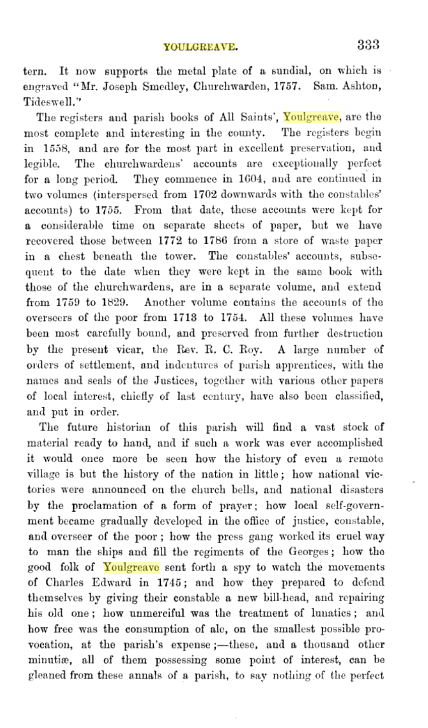
Although the Youlgreave parish registers are available online on microfilm, just the baptisms, marriages and burials are provided on the genealogy websites. However, I found some excerpts from the churchwardens accounts in a couple of old books, The Reliquary 1864, and Notes on Derbyshire Churches 1877.
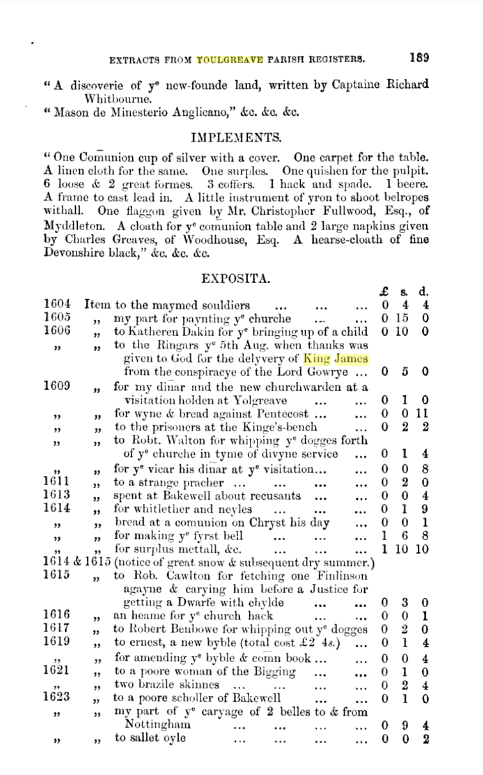
Hannah Keeling, my 4x great grandmother, was born in Youlgreave, Derbyshire, in 1767. In 1791 she married Edward Lees of Hartington, Derbyshire, a village seven and a half miles south west of Youlgreave. Edward and Hannah’s daughter Sarah Lees, born in Hartington in 1808, married Francis Featherstone in 1835. The Featherstone’s were farmers. Their daughter Emma Featherstone married John Marshall from Elton. Elton is just three miles from Youlgreave, and there are a great many Marshall’s in the Youlgreave parish registers, some no doubt distantly related to ours.
Hannah Keeling’s parents were John Keeling 1734-1823, and Ellen Frost 1739-1805, both of Youlgreave.
On the burial entry in the parish registers in Youlgreave in 1823, John Keeling was 88 years old when he died, and was the “late parish clerk”, indicating that my 5x great grandfather played a part in compiling the “best parish registers in the country”. In 1762 John’s father in law John Frost died intestate, and John Keeling, cordwainer, co signed the documents with his mother in law Ann. John Keeling was a shoe maker and a parish clerk.
John Keeling’s father was Thomas Keeling, baptised on the 9th of March 1709 in Youlgreave and his parents were John Keeling and Ann Ashmore. John and Ann were married on the 6th April 1708. Some of the transcriptions have Thomas baptised in March 1708, which would be a month before his parents married. However, this was before the Julian calendar was replaced by the Gregorian calendar, and prior to 1752 the new year started on the 25th of March, therefore the 9th of March 1708 was eleven months after the 6th April 1708.
Thomas Keeling married Dorothy, which we know from the baptism of John Keeling in 1734, but I have not been able to find their marriage recorded. Until I can find my 6x great grandmother Dorothy’s maiden name, I am unable to trace her family further back.
Unfortunately I haven’t found a baptism for Thomas’s father John Keeling, despite that there are Keelings in the Youlgrave registers in the early 1600s, possibly it is one of the few illegible entries in these registers.
The Frosts of Youlgreave
Ellen Frost’s father was John Frost, born in Youlgreave in 1707. John married Ann Staley of Elton in 1733 in Youlgreave.
(Note that this part of the family tree is the Marshall side, but we also have Staley’s in Elton on the Warren side. Our branch of the Elton Staley’s moved to Stapenhill in the mid 1700s. Robert Staley, born 1711 in Elton, died in Stapenhill in 1795. There are many Staley’s in the Youlgreave parish registers, going back to the late 1500s.)
John Frost (my 6x great grandfather), miner, died intestate in 1762 in Youlgreave. Miner in this case no doubt means a lead miner, mining his own land (as John Marshall’s father John was in Elton. On the 1851 census John Marshall senior was mining 9 acres). Ann Frost, as the widow and relict of the said deceased John Frost, claimed the right of administration of his estate. Ann Frost (nee Staley) signed her own name, somewhat unusual for a woman to be able to write in 1762, as well as her son in law John Keeling.
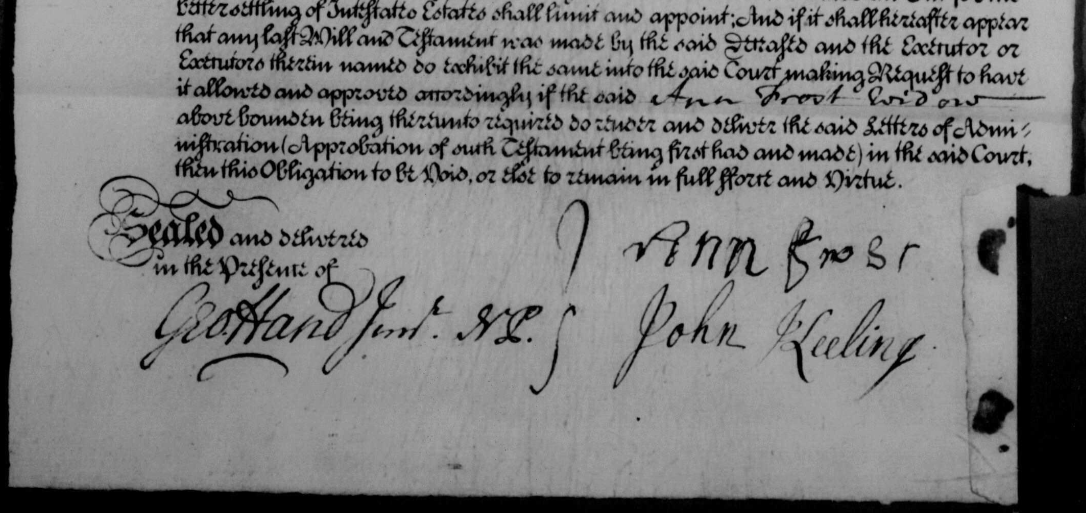
John’s parents were David Frost and Ann. David was baptised in 1665 in Youlgreave. Once again, I have not found a marriage for David and Ann so I am unable to continue further back with her family. Marriages were often held in the parish of the bride, and perhaps those neighbouring parish records from the 1600s haven’t survived.
David’s parents were William Frost and Ellen (or Ellin, or Helen, depending on how the parish clerk chose to spell it). Once again, their marriage hasn’t been found, but was probably in a neighbouring parish.
William Frost’s wife Ellen, my 8x great grandmother, died in Youlgreave in 1713. In her will she left her daughter Catherine £20. Catherine was born in 1665 and was apparently unmarried at the age of 48 in 1713. She named her son Isaac Frost (born in 1662) executor, and left him the remainder of her “goods, chattels and cattle”.
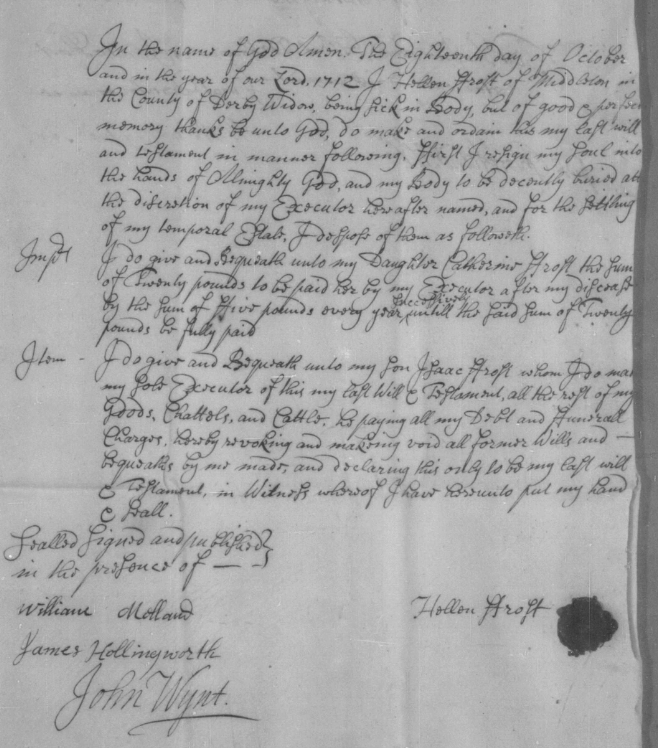
William Frost was baptised in Youlgreave in 1627, his parents were William Frost and Anne.
William Frost senior, husbandman, was probably born circa 1600, and died intestate in 1648 in Middleton, Youlgreave. His widow Anna was named in the document. On the compilation of the inventory of his goods, Thomas Garratt, Will Melland and A Kidiard are named.(Husbandman: The old word for a farmer below the rank of yeoman. A husbandman usually held his land by copyhold or leasehold tenure and may be regarded as the ‘average farmer in his locality’. The words ‘yeoman’ and ‘husbandman’ were gradually replaced in the later 18th and 19th centuries by ‘farmer’.)
Unable to find a baptism for William Frost born circa 1600, I read through all the pages of the Youlgreave parish registers from 1558 to 1610. Despite the good condition of these registers, there are a number of illegible entries. There were three Frost families baptising children during this timeframe and one of these is likely to be Willliam’s.
Baptisms:
1581 Eliz Frost, father Michael.
1582 Francis f Michael. (must have died in infancy)
1582 Margaret f William.
1585 Francis f Michael.
1586 John f Nicholas.
1588 Barbara f Michael.
1590 Francis f Nicholas.
1591 Joane f Michael.
1594 John f Michael.
1598 George f Michael.
1600 Fredericke (female!) f William.Marriages in Youlgreave which could be William’s parents:
1579 Michael Frost Eliz Staley
1587 Edward Frost Katherine Hall
1600 Nicholas Frost Katherine Hardy.
1606 John Frost Eliz Hanson.Michael Frost of Youlgreave is mentioned on the Derbyshire Muster Rolls in 1585.
(Muster records: 1522-1649. The militia muster rolls listed all those liable for military service.)
Frideswide:
A burial is recorded in 1584 for Frideswide Frost (female) father Michael. As the father is named, this indicates that Frideswide was a child.
(Frithuswith, commonly Frideswide c. 650 – 19 October 727), was an English princess and abbess. She is credited as the foundress of a monastery later incorporated into Christ Church, Oxford. She was the daughter of a sub-king of a Merica named Dida of Eynsham whose lands occupied western Oxfordshire and the upper reaches of the River Thames.)
An unusual name, and certainly very different from the usual names of the Frost siblings. As I did not find a baptism for her, I wondered if perhaps she died too soon for a baptism and was given a saints name, in the hope that it would help in the afterlife, given the beliefs of the times. Or perhaps it wasn’t an unusual name at the time in Youlgreave. A Fridesweda Gilbert was buried in Youlgreave in 1604, the spinster daughter of Francis Gilbert. There is a small brass effigy in the church, underneath is written “Frideswide Gilbert to the grave, Hath resigned her earthly part…”
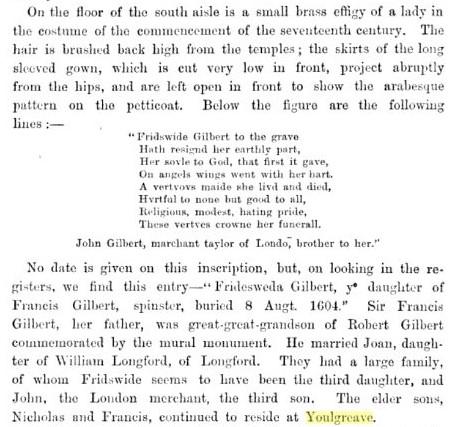
J. Charles Cox, Notes on the Churches of Derbyshire, 1877.
King James
A parish register entry in 1603:
“1603 King James of Skottland was proclaimed kinge of England, France and Ireland at Bakewell upon Monday being the 29th of March 1603.” (March 1603 would be 1604, because of the Julian calendar in use at the time.)
The Big Snow
“This year 1614/5 January 16th began the greatest snow whichever fell uppon the earth within man’s memorye. It covered the earth fyve quarters deep uppon the playne. And for heaps or drifts of snow, they were very deep; so that passengers both horse or foot passed over yates, hedges and walles. ….The spring was so cold and so late that much cattel was in very great danger and some died….”
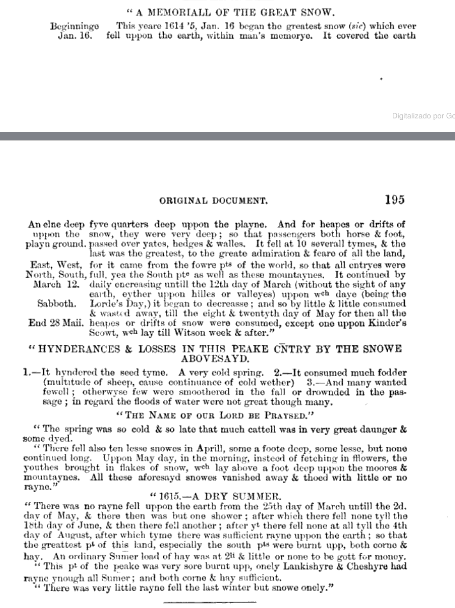
From the Youlgreave parish registers.
Our ancestor William Frost born circa 1600 would have been a teenager during the big snow.
July 21, 2024 at 11:29 pm #7537In reply to: The Incense of the Quadrivium’s Mystiques
“Will you stop flirting with that poor boy, Tru! You can’t help yourself can you?” Frella’s word were softened by the huge smile on her face. “Isn’t this place just grand?”
“Frella! Don’t be sneaking up on a person like that!” Truella gave her friend a hug. “Anyway, you won’t believe it but Malove is going to be here! I mean, talk about unexpected plot twists. And you know she’s not going to be thrilled when she finds out I’ve nabbed her corner pod!” She giggled, albeit a little nervously.
Frella grimaced. “Tru, you’d better be careful. Malove’s not one to take things lightly, especially when it comes to her personal space.”
“Oh don’t worry. It will be fine. Anyway, what about your fancy man? Will he be here doing his important MAMA spy work? I do hope so. Dear Cedric always brings a certain je ne sais quoi to the scene.” Truella rolled her eyes and smirked.
“Oh you mean tart! And he’s NOT my fancy man but yeah, he is going to be here. You should be glad we’ve got someone on the inside. Those MAMA agents can be pesky devils and they’re bound to be sneaking around a gig like this.”
July 19, 2024 at 12:26 pm #7536In reply to: The Incense of the Quadrivium’s Mystiques
The rainbow was neon bright, one end disappearing behind a spinney in the distance, and the other end landing squarely in the middle of the glamping pods. A good sign! thought Truella, the first of the coven to arrive. For a moment she imagined herself digging a hole right there, and finding the elusive pot of gold. I wouldn’t be able to do that in a fancy hotel. For once, Truella was happy with Austreberthe’s choice. A week or two in a green field sounded relaxing, refreshing. So much more to her taste than the endless fitted carpets, closed windows, and artifically controlled air blasting out of metal grilles in hotels.
Taking a deep breath of cool fresh air, she surveyed the site before checking into reception. The neighbouring fields were full of cows, perfect for her to practice her Bubona spells on before she set up her Goddess Spell Booth. The Goddess spell tents were to be open in the evenings, after the games each day, along with other stalls selling handicrafts, homemade cakes and jams, wines and potions, trinkets and souvenirs, and all the other tat that people on holiday enjoyed browsing. Obviously the coven would have a stall selling incense. No doubt Austreberthe would have hatched some hard sell plan for that.
Inside the reception office, Truella pinged the bell and waited for someone to attend. The registration book was open on the counter and Truella craned her neck to read the names on the list. She planned to ask for a pod in a far corner, near the hedgerow. It might make it easier to slip out unnoticed, if she should have a mind to do so. The door behind the counter opened and a young man appeared, smiling a welcome. But not before Truella had seen the name on the list. She sucked her breath in sharply. Malove! Nobody was expecting her. Did Austreberthe know?
“Welcome to Finnegan’s Farm Glampsite, I’m Liam,” said the young man, pushing long mousy hair out of his eyes, “You’ve a booking I take it, because we’re fully booked up for the next fortnight. Because of the Games, you see.”
Replying that she did, Truella asked for a pod in the furthest corner. Liam looked at a list and frowned. “The corners are all taken, I’m afraid. But I tell you what,” he said, “As you’re the first to arrive I’ll swap your pod, let’s see…” He scanned the list. “Ah yes, the late booking. I can put you in the one we’ve assigned to Mrs …Malone I think it says, and put her in yours.”
“Thank you very much, Liam,” Truella said as he handed her a key with a big wooden tag with the number 33 etched on it.
“I’ll carry your bags over and show you where it is, follow me.”
June 13, 2024 at 9:32 am #7472In reply to: The Incense of the Quadrivium’s Mystiques
When Truella had stopped reacting, she had another look over the memo, noticing the location of the preposterous sounding coven they were to associate with. She had assumed that it would be in the north, or at least in Madrid, but was astonished to discover they were based very close to her village. She wondered why she had never heard of them. She supposed that they did their money minded business elsewhere and were merely based here, hidden in the cork woods, masquerading as one of those ghastly upmarket hotels for corrupt politicians. One could only see the distinctive tower from the roads, as the old convent was hidden deep in the woods. Nobody Truella knew had ever had any money to get through the gates and have a closer look.
This gave Truella an idea. What an opportunity! It would give her a way in.
Actually, I think it might be a great idea, girls. Let’s give it our best shot. Austreberthe has my support on this.
Eris, Frella and Zez nearly dropped their gadgets when they read Truella’s latest message. Frella was the first to respond.
Go on then, tell us. What changed your mind?
Location, location, location! Truella replied. Check out where they’re based!
After a few minutes, Frella replied.
You better spill the beans and tell us what you’re planning. That is, if you want us to cooperate with you and go along with this latest trashy money grabbing fiasco in the making. I thought our plan was to have the summer off? What does the location mean to you?
Speak for yourself, Frella, Eris replied, rather miffed. At least she’s going to go along with it, for Flove’s sake, let’s just do what we’ve been asked to do without complaining for once!
I’m with you, Eris, Jeezel piped up, I quite fancy a flamenco puffer jacket. Or a nice knitted sombrero. And we can visit Truella while we’re there on business.
Outnumbered, Frella sighed. I still think Truella should explain. Explain fully. And don’t expect me anytime soon, either. I have to solve the mystery of the camphor chest first.
June 9, 2024 at 6:51 pm #7463In reply to: The Incense of the Quadrivium’s Mystiques
It was unlike Idle to reply to Truella’s email so promply.
Ah, Malové – she’d chase coins even if they were rolling off a cliff, that one. Alright, let’s strategize. You want a summer full of lazy days and fewer cauldrons bubbling with business schemes? First off, you can’t just hit her with “we need a break.” She’ll give you a lecture longer than the Nile on how “witchcraft never takes a holiday.” You need to catch her where she’s least fortified – in her relentless quest for profit.
Propose a Profitable Diversion: Convince her that giving everyone the summer off will actually increase productivity in the long run. Mention something about “rejuvenating our mystical energies to double our efficiency,” sprinkle some buzzwords in there. But make it tangible – maybe promise an autumn harvest of particularly lucrative spells.
Delegate the Drudgery: See if you can drum up a few apprentices or temporary hires to take over the basic grunt work for the summer. Tell Malové it’s a great opportunity to train new talent while you all focus on higher, strategic endeavors – which, of course, you can conveniently do from a hammock with a cocktail.
Truella thought this was a terrific idea.
Create a Catastrophic Scenario: Paint a picture of a burnout crisis in the coven. Suggest that ongoing stress might lead to mistakes, which could, I dunno, turn a lucrative potion into explosive chaos, unraveling all her precious profits. A summer hiatus could be framed as a preventive measure to avoid such disasters.
Distract with a Bigger Bone: Find a massive project that requires her singular focus – maybe even a solo venture. Get her so engrossed in this grand scheme that she barely notices you’re all slinking off away from the grind. Bonus points if it’s a decoy project you don’t actually care about.
Now there’s an idea, good old Idle’s on form, Truella sighed gratefully. She made it all sound so easy.
Leverage the Cleaning Conundrum: Remember Finnlee and the manual cleaning? Suggest that you need to undergo a “summer cleaning initiative” to physically and spiritually cleanse the headquarters, and this process “requires” the witches to be away. It’ll appeal to Malové’s practicality and her penchant for a neat, profitable operation.
Emphasize the Carnival’s Aftermath: Play up the importance of digesting the energy you’re about to collect from the Carnival. Frame it as a necessary incubation period – the energies need time to percolate and clarify before being crafted into those procreation-boosting incenses. Also, suggest it’s the perfect time to trial promising new volunteers eager for a taste of witchy life. You’re a clever lot; use whatever mix of these tactics suits your fancy, and don’t forget to sprinkle it all with just the right touch of sincerity and urgency. As long as she buys into the grand scheme, you might just find yourself lounging through summer without a care in the world, at least until Malové sniffs out the next opportunity. So, get plotting, and let’s see if you can keep Malové’s gold-scrying eyes off the coven for a blissfully quiet summer. Need help drafting the message?
February 24, 2024 at 7:51 pm #7387In reply to: The Incense of the Quadrivium’s Mystiques
The full moon was rising behind the mountains as Frigella turned off the road for the last lap of the journey down a dirt track. Daunted at first by the thought of the long drive, the prospect of a weeks holiday had lifted her spirits. There was altogether too much going on of late for a simple country hedge witch, and that carnaval mayhem had made her grumpy and withdrawn, but the drive had restored her equilibrium.
Truella rolled down the passenger window and laughed as the cool night air rushed in. “Nearly there now, I can hardly believe I made it back in one piece.”
“You and me both,” laughed Frigella. “There’s nothing I fancy more now than a couple of glasses of your lovely red wine but we’d better make a start on the spell to bring Roger back right away. This moon is perfect tonight.”
“I can’t see any reason why we can’t do both,” Truella grinned. Frigella started to object, and then stopped herself. They had arrived and she was on holiday and she deserved to sit and enjoy a drink with her friend and her responsibilities and obligations would just have to wait, at least for an hour or two.
“Why not indeed,” she said, “Why the hell not. You can tell me about finding the hippocampus statue in the dig. Great timing I must say, and the smoked hippo bones as well, just when we need to use that spell.”
“And a full moon as well. And it’s full all night long, we have plenty of time.”
February 15, 2024 at 10:34 am #7372In reply to: The Incense of the Quadrivium’s Mystiques
After a long, long-haul flight, Sha was woken up by the ding of the landing announcement. Glor was still snoring loudly spread over the limited space of their economy places, her mouth agape, the armrest dangerously stuck in her ample forms. They were finally landing in Rio for the Carnival!
Sha: “Glor, Glor! Wake up, love, we’re almost there! Can’t believe that Bingo win’s got us all the way to Rio!”
Glo: “Eh? Wha’? Oh crikey, we’re not on the number 52 bus to Piccadilly? My bunions were having the most delightful dream.”
Mavis popped her head from the place behind them. The attendant signaled her with a rude gesture to stay seated, as the engines were stating to roar announcing the close landing.
Mavis: “Oh, I do hope they have those fancy coxcombs at the carnival. You know, the ones with all the feathers and sparkles. Our Bernard used to say I looked like a proper mopsy with one on me head.”
Sha: “Now Mavis, don’t you go getting ideas above your station. We’re here for the festivities, not to join the parade! Though, a little samba wouldn’t hurt, eh?”
Glo: “Samba? I thought that was a kind of sandwich. I ain’t dancing, not with my sciatica. I’ll just sit and supervise, yeah?”
Mavis: “I brought me camera, you know, the one with the clicky button. Gonna take pictures of all the costumes and such. Might even sneak in a selfie, show it off at the bingo hall.”
Sha: “Pack it in, you two. Let’s just make sure we find our hotel. You remember what happened last time. Glor here thought the luggage conveyor was a ride and we spent three hours in customs!”
Glo: “Not my fault, Sha. It was moving and I thought, ‘Why not?’ Adventure is the spice of life, ain’t it?”
Mavis: “Well, as long as there’s a good cuppa at the end of it, I’m game for anything. Let’s get this carnival caper started, girls!”
February 6, 2024 at 12:11 am #7352In reply to: The Incense of the Quadrivium’s Mystiques
“If it’s nae Frigella O’green! Fancy seeing ye ‘ere!”
Frigella stiffened. She’d know that accent and the dank tang of peat moss anywhere. She’d have smelt it sooner if it weren’t for the brewing coffee. She must be getting soft … or maybe it was the sour smell of smoke clogging up her nostrils; she’d not been able to shake the stench since the debacle that morning. Turning away from Aaron, the pleasant young barista serving her, she willed her lips into a smile – no harm in being civil! It was a long time since all the Scottish shenanigans and word amongst the witches was the Scots Coven were trying to tidy up their act.
“Well, If it’s not Aggie Bog now!” Frigella leaned in for a cool peck on the cheek. “And what brings you to these parts? Let me buy you a coffee and we can catch up?”
Aggie sniggered. ” Ye pay for it?” She pushed Frigella aside and approached the counter. Aaron’s eyes widened and Frigella had to admit Aggie cut a striking figure in her tiny black top and leather leggings. As a child she’d been taunted and called fat, but now she was best described as Rubenesque, and clearly had learned how to use her assets.
I bet those pants squeak when she walks.
Aggie leaned forward and Aaron’s gaze flicked toward her abundant cleavage. “A double black insomnia fur me, on the hoose.” As Aaron started to protest, Aggie waved several plump fingers towards his face and Frigella saw his eyes were now dark and glazed. “Whirling ‘n’ twirling a muckle puff o’ rowk,” crooned Aggie. “Ye’ll dae as ah say or caw intae a ….”
Frigella clasped Aggie’s wrist. Thank god the lunch crowd had gone and the cafe was nearly empty apart from an older man reading his paper by the window. “Aggie Bog! Shame on you! That’s not the way we do things here.”
November 19, 2023 at 6:48 pm #7287In reply to: Orbs of Madjourneys
“It’s you!” Youssef laughed when Zara replied to his application for the job uncovering a lost civilization. “What are you doing sending me spam like that?”
“I knew you wouldn’t be able to resist,” Zara smiled. “You won’t believe what I’ve found. Nobody is going to beleive it. But I need some extra hands.”
“But you could have just asked me!” Youssef replied.
“Well, I was sitting here having a banana eating scroll…”
“Never have a banana eating scroll, it’s a dangerous combination. ”
“Sounds like a llama munching a burrito, but more dangeous,” Xavier had appeared in the chat window, with his customary perfect timing.
“I don’t fancy Australia though, after the Tartiflate debacle,” Youssef said.
“It’s Tasmoania, not Australia. A different kettle of fish entirely. Look what I found today. Damn, no banana for scale, I just ate it.”
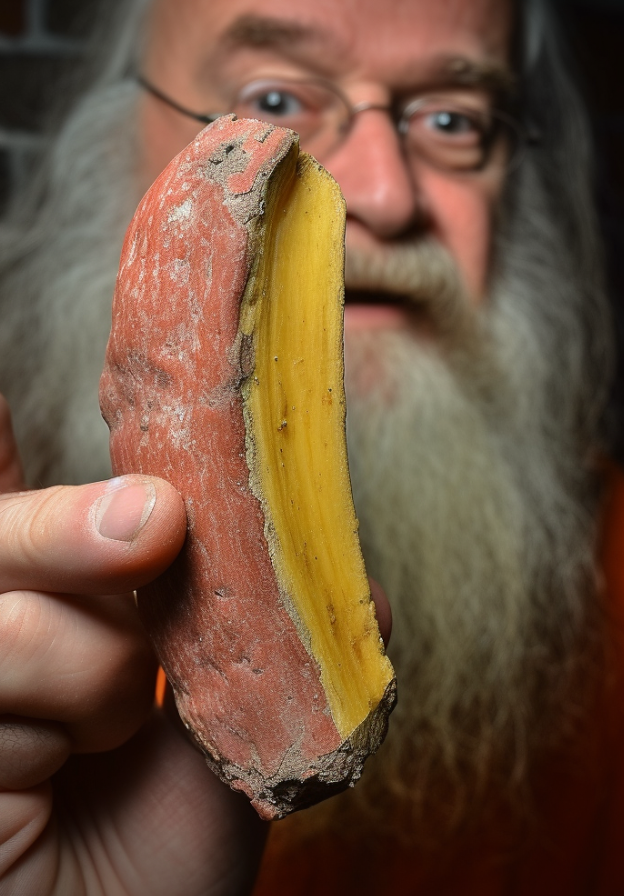
“What is it? And who’s the old guy?” Youssef asked.
“That’s Havelock Gnomes, he’s an expert on undiscovered civilizations. He’s come over specially from New Zipland to help with the investigation. He plays the violin, too.”
“Wasn’t Xavier supposed to find that for his mission?” Yasmin had joined the chat.
“Precisely, Yassie, that’s why he’s coming over too. Well, maybe something LIKE that, we don’t know yet.”
“Yes, but what IS that thing?” Yasmin asked.
“I am?” It was news to Xavier, but he rolled the idea round in his mind with a growing interest. He was due for some time off and had been wondering what to do. “That thing looks like the burrito I mentioned earlier.”
“How prescient of you, Xavi!” Yasmin exclaimed rather cheekily.
“That’s no burrito! Nothing like this has ever been found before!”
“Yes BUT WHAT IS IT?”
“Yas, Havelock thinks it might be…. well I am not going to spill the beans, but we need help to uncover the rest of it. Do say you’ll come, all of you!”
“Sounds like quite the picnic, what with kettles of fish, beans, burritos and bananas. I’m in!” announced Youssef.
September 18, 2023 at 8:29 am #7278In reply to: Family Stories From The Other Side ~ Book Two
Tomlinson of Wergs and Hancox of Penn
John Tomlinson of Wergs (Tettenhall, Wolverhamton) 1766-1844, my 4X great grandfather, married Sarah Hancox 1772-1851. They were married on the 27th May 1793 by licence at St Peter in Wolverhampton.
Between 1794 and 1819 they had twelve children, although four of them died in childhood or infancy. Catherine was born in 1794, Thomas in 1795 who died 6 years later, William (my 3x great grandfather) in 1797, Jemima in 1800, John, Richard and Matilda between 1802 and 1806 who all died in childhood, Emma in 1809, Mary Ann in 1811, Sidney in 1814, and Elijah in 1817 who died two years later.On the 1841 census John and Sarah were living in Hockley in Birmingham, with three of their children, and surgeon Charles Reynolds. John’s occupation was “Ind” meaning living by independent means. He was living in Hockley when he died in 1844, and in his will he was “John Tomlinson, gentleman”.
Sarah Hancox was born in 1772 in Penn, Wolverhampton. Her father William Hancox was also born in Penn in 1737. Sarah’s mother Elizabeth Parkes married William’s brother Francis in 1767. Francis died in 1768, and in 1770 Elizabeth married William.
William’s father was William Hancox, yeoman, born in 1703 in Penn. He died intestate in 1772, his wife Sarah claiming her right to his estate. William Hancox and Sarah Evans, both of Penn, were married on the 9th December 1732 in Dudley, Worcestershire, by “certificate”. Marriages were usually either by banns or by licence. Apparently a marriage by certificate indicates that they were non conformists, or dissenters, and had the non conformist marriage “certified” in a Church of England church.
1732 marriage of William Hancox and Sarah Evans:

William and Sarah lost two daughters, Elizabeth, five years old, and Ann, three years old, within eight days of each other in February 1738.
William the elder’s father was John Hancox born in Penn in 1668. He married Elizabeth Wilkes from Sedgley in 1691 at Himley. John Hancox, “of Straw Hall” according to the Wolverhampton burial register, died in 1730. Straw Hall is in Penn. John’s parents were Walter Hancox and Mary Noake. Walter was born in Tettenhall in 1625, his father Richard Hancox. Mary Noake was born in Penn in 1634. Walter died in Penn in 1689.
Straw Hall thanks to Bradney Mitchell:
“Here is a picture I have of Straw Hall, Penn Road.
The painting is by John Reid circa 1878.
Sketch commissioned by George Bradney Mitchell to record the town as it was before its redevelopment, in a book called Wolverhampton and its Environs. ©”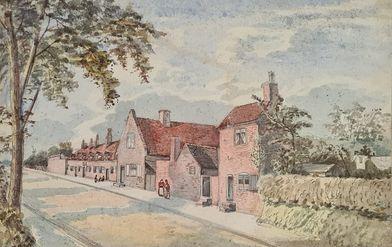
And a photo of the demolition of Straw Hall with an interesting story:
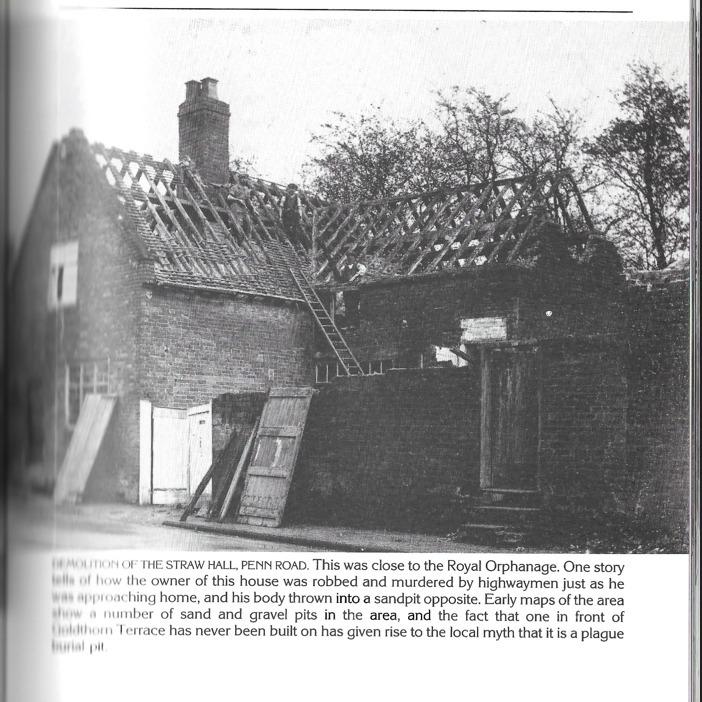
In 1757 a child was abandoned on the porch of Straw Hall. Aris’s Birmingham Gazette 1st August 1757:

The Hancox family were living in Penn for at least 400 years. My great grandfather Charles Tomlinson built a house on Penn Common in the early 1900s, and other Tomlinson relatives have lived there. But none of the family knew of the Hancox connection to Penn. I don’t think that anyone imagined a Tomlinson ancestor would have been a gentleman, either.
Sarah Hancox’s brother William Hancox 1776-1848 had a busy year in 1804.
On 29 Aug 1804 he applied for a licence to marry Ann Grovenor of Claverley.
In August 1804 he had property up for auction in Penn. “part of Lightwoods, 3 plots, and the Coppice”
On 14 Sept 1804 their first son John was baptised in Penn. According to a later census John was born in Claverley. (before the parents got married)(Incidentally, John Hancox’s descendant married a Warren, who is a descendant of my 4x great grandfather Samuel Warren, on my mothers side, from Newhall, Derbyshire!)
On 30 Sept he married Ann in Penn.
In December he was a bankrupt pig and sheep dealer.
In July 1805 he’s in the papers under “certificates”: William Hancox the younger, sheep and pig dealer and chapman of Penn. (A certificate was issued after a bankruptcy if they fulfilled their obligations)
He was a pig dealer in Penn in 1841, a widower, living with unmarried daughter Elizabeth.Sarah’s father William Hancox died in 1816. In his will, he left his “daughter Sarah, wife of John Tomlinson of the Wergs the sum of £100 secured to me upon the tolls arising from the turnpike road leading from Wombourne to Sedgeley to and for her sole and separate use”.
The trustees of toll road would decide not to collect tolls themselves but get someone else to do it by selling the collecting of tolls for a fixed price. This was called “farming the tolls”. The Act of Parliament which set up the trust would authorise the trustees to farm out the tolls. This example is different. The Trustees of turnpikes needed to raise money to carry out work on the highway. The usual way they did this was to mortgage the tolls – they borrowed money from someone and paid the borrower interest; as security they gave the borrower the right, if they were not paid, to take over the collection of tolls and keep the proceeds until they had been paid off. In this case William Hancox has lent £100 to the turnpike and is leaving it (the right to interest and/or have the whole sum repaid) to his daughter Sarah Tomlinson. (this information on tolls from the Wolverhampton family history group.)William Hancox, Penn Wood, maltster, left a considerable amount of property to his children in 1816. All household effects he left to his wife Elizabeth, and after her decease to his son Richard Hancox: four dwelling houses in John St, Wolverhampton, in the occupation of various Pratts, Wright and William Clarke. He left £200 to his daughter Frances Gordon wife of James Gordon, and £100 to his daughter Ann Pratt widow of John Pratt. To his son William Hancox, all his various properties in Penn wood. To Elizabeth Tay wife of Thomas Tay he left £200, and to Richard Hancox various other properties in Penn Wood, and to his daughter Lucy Tay wife of Josiah Tay more property in Lower Penn. All his shops in St John Wolverhamton to his son Edward Hancox, and more properties in Lower Penn to both Francis Hancox and Edward Hancox. To his daughter Ellen York £200, and property in Montgomery and Bilston to his son John Hancox. Sons Francis and Edward were underage at the time of the will. And to his daughter Sarah, his interest in the toll mentioned above.
Sarah Tomlinson, wife of John Tomlinson of the Wergs, in William Hancox will:
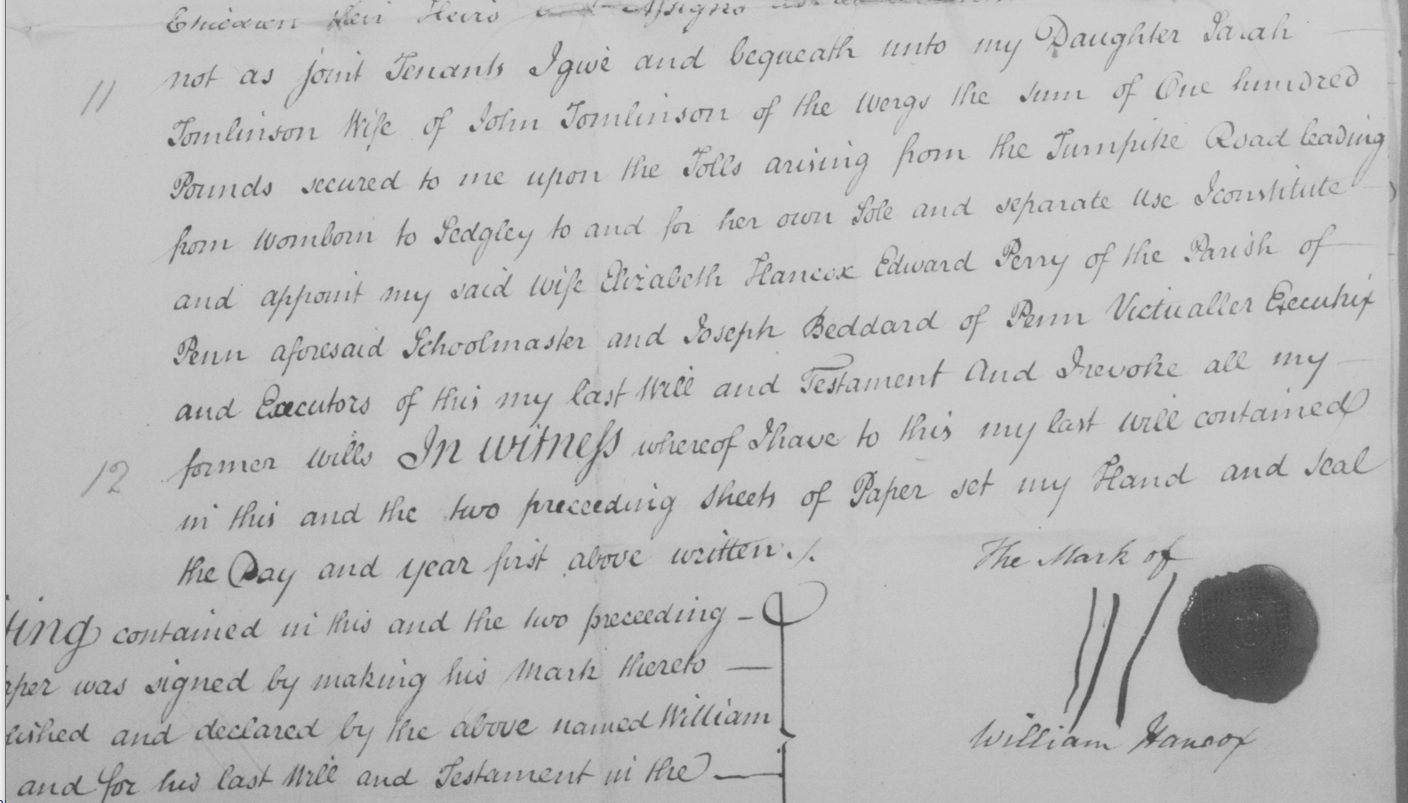 August 17, 2023 at 4:32 pm #7268
August 17, 2023 at 4:32 pm #7268In reply to: Family Stories From The Other Side ~ Book Two
William Tomlinson
1797-1867
The Tomlinsons of Wolverhampton were butchers and publicans for several generations. Therefore it was a surprise to find that William’s father was a gentleman of independant means.
William Tomlinson 1797-1867 was born in Wergs, Tettenhall. His birthplace, and that of his first four children, is stated as Wergs on the 1851 census. They were baptised at St Michael and All Angels church in Tettenhall Regis, as were many of the Tomlinson family including William.
Tettenhall, St Michael and All Angels church:
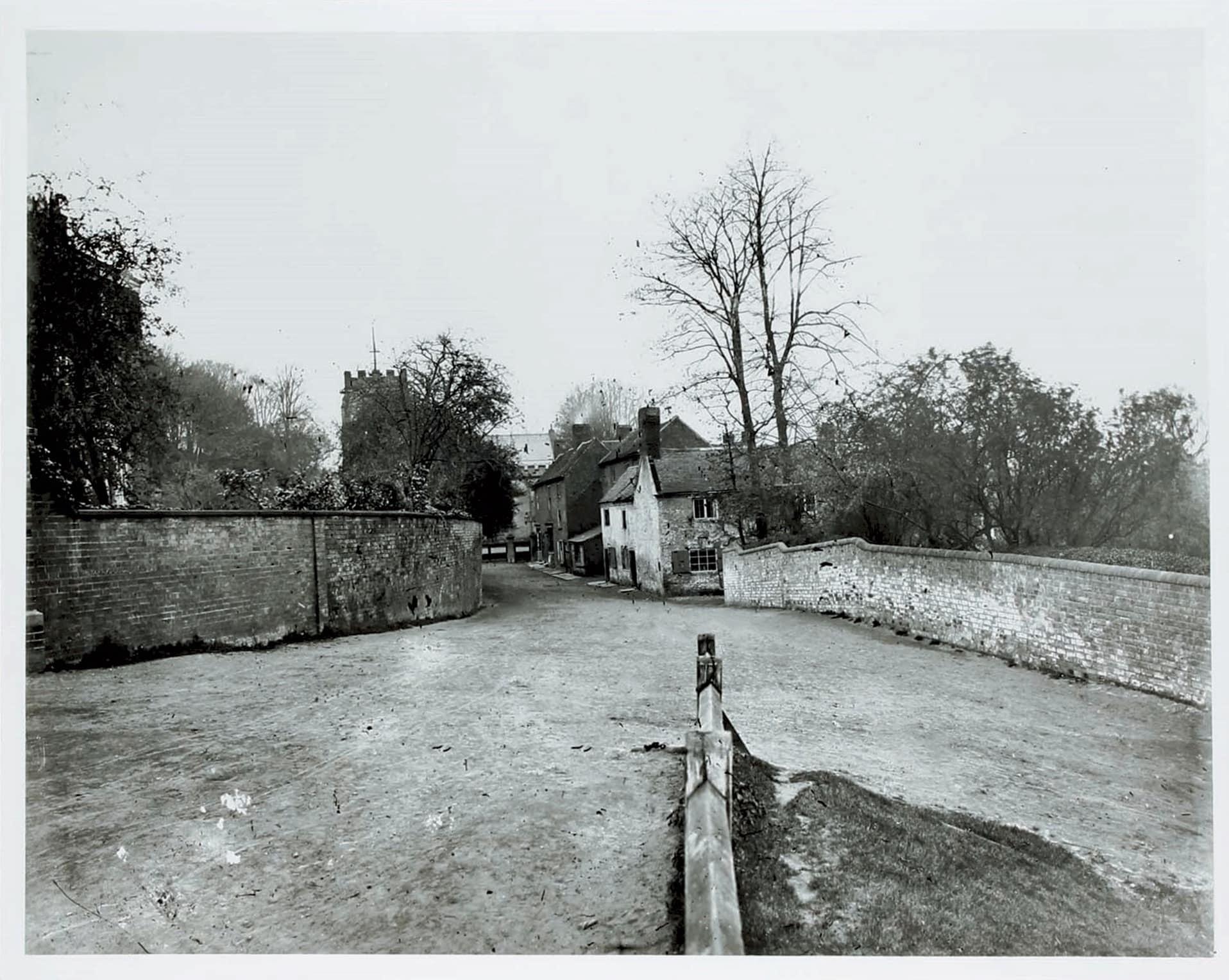
Wergs is a very small area and there was no other William Tomlinson baptised there at the time of William’s birth. It is of course possible that another William Tomlinson was born in Wergs and the record of the baptism hasn’t been found, but there are a number of other documents that prove that John Tomlinson, gentleman of Wergs, was Williams father.
In 1834 on the Shropshire Quarter session rolls there are two documents regarding William. In October 1834 William Tomlinson of Tettenhall, son of John, took an examination. Also in October of 1834 there is a reconizance document for William Tomlinson for “pig dealer”. On the marriage certificate of his son Charles Tomlinson to Emma Grattidge (mistranscribed as Pratadge) in 1872, father William’s occupation is “dealer”.
William Tomlinson was a witness at his sister Catherine and Benjamin Smiths wedding in 1822 in Tettenhall. In John Tomlinson’s 1844 will, he mentions his “daughter Catherine Smith, wife of Benjamin Smith”. William’s signature as a witness at Catherine’s marriage matches his signature on the licence for his own marriage to Elizabeth Adams in 1827 in Shareshill, Staffordshire.
William’s signature on his wedding licence:

Williams signature as a witness to Catherine’s marriage:

William was the eldest surviving son when his father died in 1844, so it is surprising that William only inherited £25. John Tomlinson left his various properties to his daughters, with the exception of Catherine, who also received £25. There was one other surviving son, Sidney, born in 1814. Three of John and Sarah Tomlinson’s sons and one daughter died in infancy. Sidney was still unmarried and living at home when his father died, and in 1851 and 1861 was living with his sister Emma Wilson. He was unmarried when he died in 1867. John left Sidney an income for life in his will, but not property.
In John Tomlinson’s will he also mentions his daughter Jemima, wife of William Smith, farmer, of Great Barr. On the 1841 census William, butcher, is a visitor. His two children Sarah and Thomas are with him. His wife Elizabeth and the rest of the children are at Graisley Street. William is also on the Graisley Street census, occupation castrator. This was no doubt done in error, not realizing that he was also registered on the census where he was visiting at the time.
William’s wife, Elizabeth Adams, was born in Tong, Shropshire in 1807. The Adams in Tong appear to be agricultural labourers, at least on later censuses. Perhaps we can speculate that John didn’t approve of his son marrying an agricutural labourers daughter. Elizabeth would have been twenty years old at the time of the marriage; William thirty.
July 5, 2023 at 8:21 pm #7263In reply to: Family Stories From The Other Side ~ Book Two
Solomon Stubbs
1781-1857
Solomon was born in Hamstall Ridware, Staffordshire, parents Samuel Stubbs and Rebecca Wood. (see The Hamstall Ridware Connection chapter)
Solomon married Phillis Lomas at St Modwen’s in Burton on Trent on 30th May 1815. Phillis was the llegitimate daughter of Frances Lomas. No father was named on the baptism on the 17th January 1787 in Sutton on the Hill, Derbyshire, and the entry on the baptism register states that she was illegitimate. Phillis’s mother Frances married Daniel Fox in 1790 in Sutton on the Hill. Unfortunately this means that it’s impossible to find my 5X great grandfather on this side of the family.
Solomon and Phillis had four daughters, the last died in infancy.
Sarah 1816-1867, Mary (my 3X great grandmother) 1819-1880, Phillis 1823-1905, and Maria 1825-1826.Solomon Stubbs of Horninglow St is listed in the 1834 Whites Directory under “China, Glass, Etc Dlrs”. Next to his name is Joanna Warren (earthenware) High St. Joanna Warren is related to me on my maternal side. No doubt Solomon and Joanna knew each other, unaware that several generations later a marriage would take place, not locally but miles away, joining their families.
Solomon Stubbs is also listed in Whites Directory in 1831 and 1834 Burton on Trent as a land carrier:
“Land Carriers, from the Inns, Etc: Uttoxeter, Solomon Stubbs, Horninglow St, Mon. Wed. and Sat. 6 mng.”
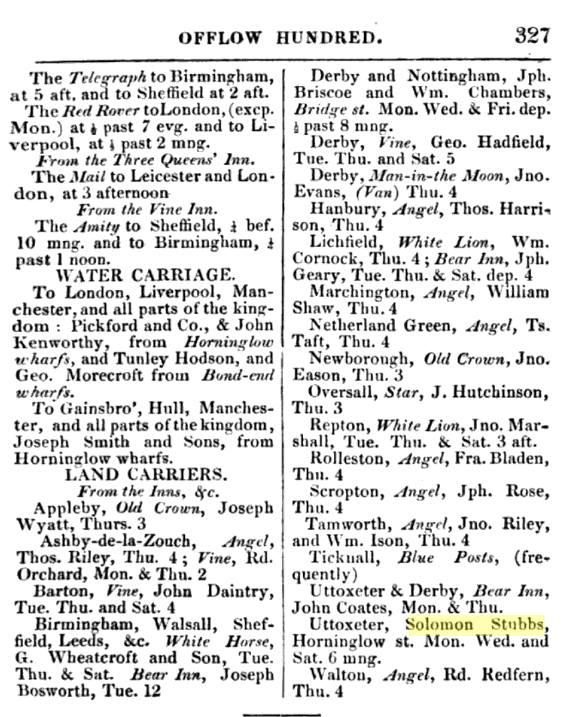
Solomon is listed in the electoral registers in 1837. The 1837 United Kingdom general election was triggered by the death of King William IV and produced the first Parliament of the reign of his successor, Queen Victoria.
National Archives:
“In 1832, Parliament passed a law that changed the British electoral system. It was known as the Great Reform Act, which basically gave the vote to middle class men, leaving working men disappointed.
The Reform Act became law in response to years of criticism of the electoral system from those outside and inside Parliament. Elections in Britain were neither fair nor representative. In order to vote, a person had to own property or pay certain taxes to qualify, which excluded most working class people.”Via the Burton on Trent History group:
“a very early image of High street and Horninglow street junction, where the original ‘ Bargates’ were in the days of the Abbey. ‘Gate’ is the Saxon meaning Road, ‘Bar’ quite self explanatory, meant ‘to stop entrance’. There was another Bargate across Cat street (Station street), the Abbot had these constructed to regulate the Traders coming into town, in the days when the Abbey ran things. In the photo you can see the Posts on the corner, designed to stop Carts and Carriages mounting the Pavement. Only three Posts remain today and they are Listed.”
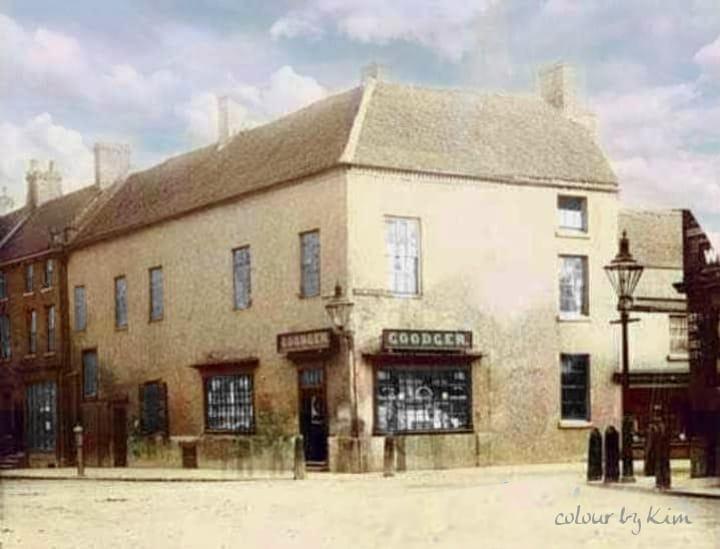
On the 1841 census, Solomon’s occupation was Carrier. Daughter Sarah is still living at home, and Sarah Grattidge, 13 years old, lives with them. Solomon’s daughter Mary had married William Grattidge in 1839.
Solomon Stubbs of Horninglow Street, Burton on Trent, is listed as an Earthenware Dealer in the 1842 Pigot’s Directory of Staffordshire.
In May 1844 Solomon’s wife Phillis died. In July 1844 daughter Sarah married Thomas Brandon in Burton on Trent. It was noted in the newspaper announcement that this was the first wedding to take place at the Holy Trinity church.
Solomon married Charlotte Bell by licence the following year in 1845. She was considerably younger than him, born in 1824. On the marriage certificate Solomon’s occupation is potter. It seems that he had the earthenware business as well as the land carrier business, in addition to owning a number of properties.
The marriage of Solomon Stubbs and Charlotte Bell:
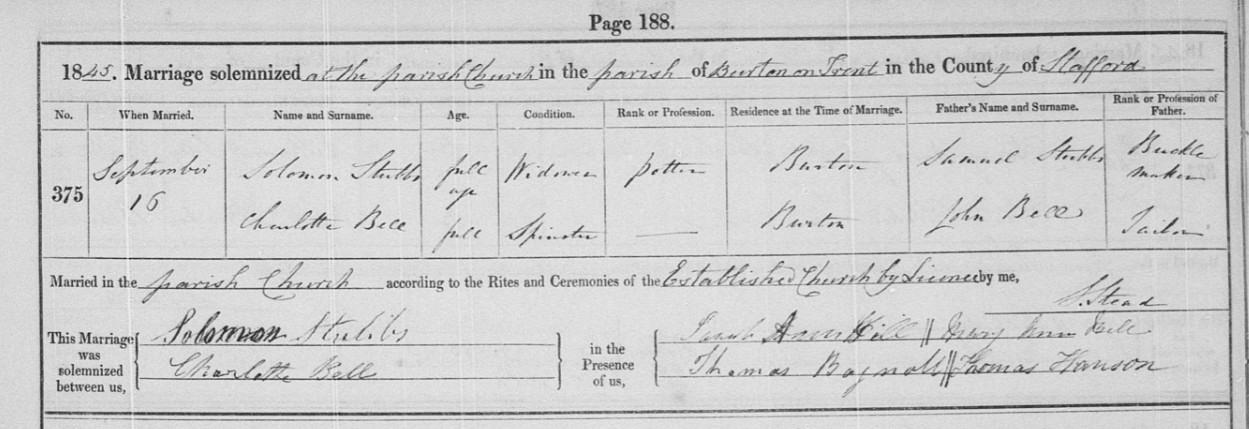
Also in 1845, Solomon’s daughter Phillis was married in Burton on Trent to John Devitt, son of CD Devitt, Esq, formerly of the General Post Office Dublin.
Solomon Stubbs died in September 1857 in Burton on Trent. In the Staffordshire Advertiser on Saturday 3 October 1857:
“On the 22nd ultimo, suddenly, much respected, Solomon Stubbs, of Guild-street, Burton-on-Trent, aged 74 years.”
In the Staffordshire Advertiser, 24th October 1857, the auction of the property of Solomon Stubbs was announced:
“BURTON ON TRENT, on Thursday, the 29th day of October, 1857, at six o’clock in the evening, subject to conditions then to be produced:— Lot I—All those four DWELLING HOUSES, with the Gardens and Outbuildings thereto belonging, situate in Stanleystreet, on Goose Moor, in Burton-on-Trent aforesaid, the property of the late Mr. Solomon Stubbs, and in the respective occupations of Mr. Moreland, Mr. Scattergood, Mr. Gough, and Mr. Antony…..”
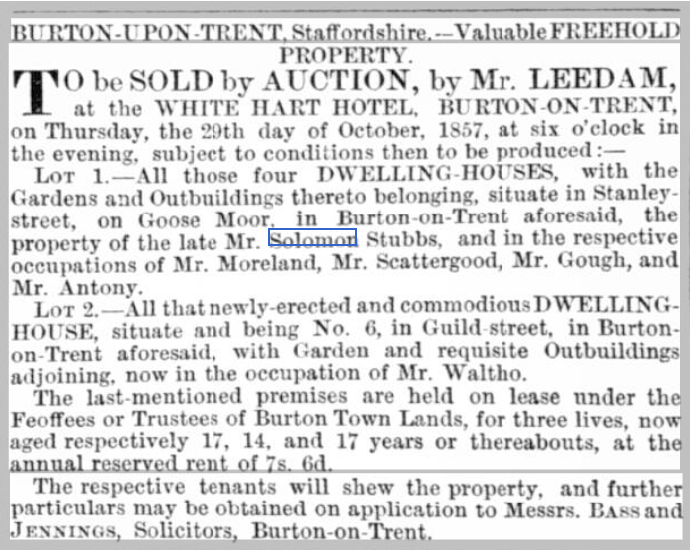
Sadly, the graves of Solomon, his wife Phillis, and their infant daughter Maria have since been removed and are listed in the UK Records of the Removal of Graves and Tombstones 1601-2007.
-
AuthorSearch Results